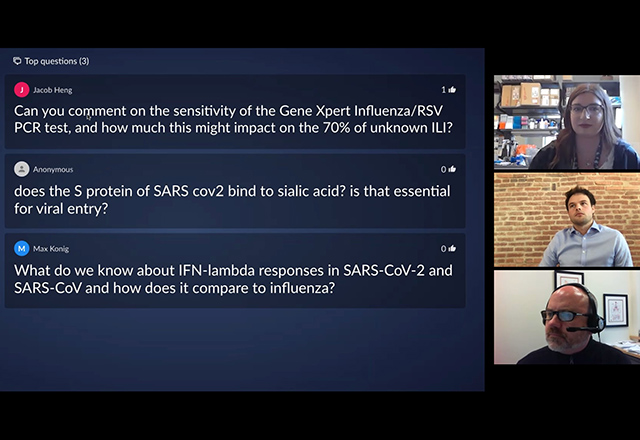Pictured above, from top: Jessica Resnick, Gideon Loevinsohn and Andrew Pekosz take questions from the audience submitted via Slido.
Partnering Toward Discovery’s (PTD) April 15 seminar was far different from the usual bustling social event held in the Turner Concourse. Amid closures due to COVID-19, the student-organized networking lecture series was forced to turn virtual for a timely discussion entitled “Respiratory Infections: Seasonal Influenza and now COVID-19.” Using a combination of Zoom and audience interaction tool Slido, participants were able to maintain the spirit of the PTD series by engaging in an online discussion that vice dean for education Roy Ziegelstein encouraged them to continue after the livestream ended.
The event kicked off with an introduction to respiratory infections from immunologist Andrew Pekosz. He discussed his work as co-director of Johns Hopkins Center of Excellence for Influenza Research and Surveillance, which focuses on characterizing viruses from human samples in order to inform public health decisions. Saying that the center has always been prepared for a potential pandemic, Pekosz described how they have quickly transitioned their efforts to focus exclusively on SARS-CoV-2.
Gideon Loevinsohn, an M.D./Ph.D. student in the Johns Hopkins Bloomberg School of Public Health, then discussed his thesis work — which he had defended earlier that day to his thesis committee via Zoom — surveilling respiratory infections in rural Zambia. His work revealed differences between the influenza burden in urban and rural areas and identified risk factors for severe disease. More broadly, it also gave the audience a context for the importance of diagnostic tools in the current pandemic, and a sense for what researchers are currently doing to understand what causes SARS-CoV-2 to present with such a range of severities.
Human genetics student Jessica Resnick wrapped up the event with a presentation of her work using cultured human epithelial cells to understand what aspects of viruses make a good vaccine. She has been comparing how her cell cultures respond to the failed U.S. 2015 H1N1 vaccine versus its successful European counterpart. The background she gave on virology and vaccines provided the foundation for a lively Q&A session with all three panelists using the website Slido, where participants could submit their questions and upvote others they also wanted answered. Pekosz, Loevinsohn and Resnick covered a range of questions primarily focused on the coronavirus epidemic, from diagnostics to vaccine development to risk factors. This dialogue not only produced engagement in the online format, but also equipped the audience to better communicate about the coronavirus to family and friends who doubtless have many questions of their own.
As PTD looks to remain virtual for the time being, the organizers and speakers demonstrated that technology can be harnessed to allow the sharing of ideas and fostering of community even in isolation. Loevinsohn admits that his virtual thesis defense and PTD presentation were challenging, but considers electronic means of science communication essential, particularly during this time of social distancing. “Due both to the widespread quarantine and the low barriers to electronic participation, I think that both my defense and the PTD event were attended by a broader audience than they might otherwise have been,” he said. “I believe that it is only by breaking the walls of echo chambers and fostering inclusion that we can develop innovative solutions.”
Related content
- Johns Hopkins Medical Students Create Campaign to Confront COVID-19 Rumors with Facts
- Partnering Toward Discovery: A Focus on Inclusion Body Myositis
- Partnering Toward Discovery: Behind the Scenes
Want to read more from the Johns Hopkins School of Medicine? Subscribe to the Biomedical Odyssey blog and receive new posts directly in your inbox.

Pingback: The Value of Weekly Seminars – Biomedical Odyssey
Comments are closed.